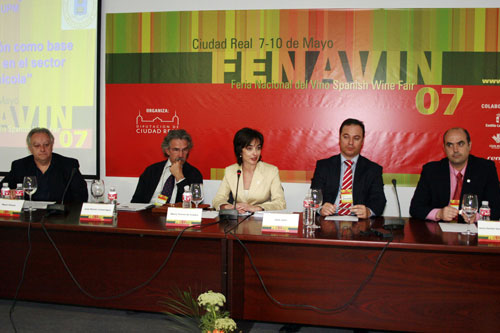Ciudad Real
May 6 - 8, 2025

10
may 2007
The theme of the round table hosted this morning at FENAVIN 2007 has been innovation as the basis for business in the viticulture sector, the same with prestigious market analysts and investigators as lecturers, under the moderation and coordination of María Teresa de Cuadra, Professor at the University of Castilla-La Mancha.
Inclusion of this activity within the program that runs parallel to the Trade Fair has represented incorporation of the academic world and of the world of investigation and projects that have been executed by and for viticulture companies present at FENAVIN 2007.
The Round Table has counted with José Ramón Lissarrague Gutiérrez, Doctor in Agricultural Engineering, specialized in viticulture, who has spoken about that which is most recent and outstanding in the scope of viticulture: new clones, new management methods pertaining to the vegetative cover and new irrigation methods. During his exposition, in just a few brief lines, he contrasted the innovative techniques in the care of the vineyard in different countries, both in the 'Old' and 'New' world, the same according to variables such as extension, available labor or environmental conditions. He highlighted the review of vine cultivation techniques in emerging economies, such as India and China, as well as use of new Chardonnay, Syrah, Merlot or Cabernet Sauvignon clones.
Miguel Olmeda Fernández, Doctor in Agricultural Engineering and specialist in Food and Agriculture Economy, has aimed his chat at presenting the latest advances in the viticulture industry in aspects as important as marketing and commercialization.
On his part, Jesús Damián García-Consuegra Bleda, Doctor in Telecommunications and Full Professor of the University of Castilla-La Mancha, presented the most recent developments and computer equipment for risk control and automated process management, within the field of software engineering innovation for wineries, as well as implantation and use of the ERP systems (Enterprise Resource Planning) in wineries.
The concept of 'precision agriculture' has been revised within this context, which with its entire technological infrastructure facilitates decision taking in real time and its immediate application to the vine, apart from in great measure refining traceability control. On the other hand the tremendous versatility of the ERP systems has been made manifest and their capacity to promote profitability of the winery business thanks to automation of administrative and commercial processes that take place at the winery.
José Joya Roldán, Industrial Technical Engineer and Licensee and Evaluator of the EFQM Corporate Management Model (European Foundation for Quality Management) has been in charge of presenting the concepts of 'Social Corporate Responsibility' (RSE), 'Innovation for Sustainability' and 'Responsible Environment', the same with specific and real examples. The exposition of an R&D and Innovation Project of the University of Málaga has been of particular interest, -'Creation of Responsible Environments for Wineries-, the same representing a project that has obtained the Award to Technological Innovation granted by the Council for Innovation, Technology and the Company of the Regional Government of Andalusia.
We use our own and third-party cookies to manage the website, obtain information about its use, improve our services or to show you advertising according to your preferences. You can click on ACCEPT, to allow the use of all cookies, or on settings to see the cookies in detail and indicate which ones you want to accept or reject. +info
Settings